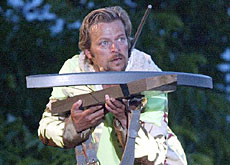William Tell takes aim at a new era

William Tell, as reinvented by the great German playwright, Friedrich Schiller, is 200 years old this year.
swissinfo is marking the anniversary with a special multimedia site which explores the legend, and asks why Tell’s shot is still reverberating round the world.
More has been written about William Tell than arguably any other person in Swiss history, and that is not bad considering the medieval archer probably never existed.
Fact or fiction, Tell’s act of defiance symbolised a mountain people’s struggle against oppression, and through Friedrich Schiller, the legendary figure became an international icon of freedom.
swissinfo follows the legendary figure through the centuries, from his humble beginnings in a rural mountain village to his grand appearance on the world’s theatrical – and political – stage.
Schiller play
Tell’s home region of central Switzerland is throwing a party in his honour this summer.
The most anticipated event has been the German National Theatre’s staging of Schiller’s play on the Rütli Meadow, the cradle of the Swiss Confederation.
The theatre company has travelled to Switzerland from Weimar, the German town where Schiller’s play had its premiere in 1804.
Friday’s VIP debut marked the first time permission had been granted for a play to be performed on the sacred meadow.
Around 2,500 spectators, including Swiss president Joseph Deiss, took their seats on a platform facing a stunning backdrop of forests, mountains and Lake Lucerne.
The Rütli was studded with 26 sculptures, representing each of the cantons of modern Switzerland, carved from rocks and tree trunks by the German artist, Günther Uecker.
These landmark performances run until August 29.
Altdorf pageantry
“Wilhelm Tell” will also be staged from August 20 to October 16 at the Tell Playhouse in Altdorf, the capital of canton Uri.
Altdorf boasts an almost 500-year tradition of staging a play about Tell, which predates Schiller’s drama by 300 years.
Local amateur actors will present a new adaptation of William Tell, based on the Schiller text but also their own interpretation of Swiss history.
Interlaken also has a long tradition of staging the Schiller work.
Even though the resort is located in the Bernese Oberland, far from the Swiss cantons which founded the Confederation, it has been the scene of Tell productions since 1912.
The Interlaken open-air production is a grand affair with about 200 amateur actors performing on a set with real chalets as the backdrop.
The villain of the piece, Gessler, makes his introduction mounted on a horse.
“Please check in”
The Forum of Swiss History in the town of Schwyz is trying to get to grips with the legendary hero through an exhibition, “Tell, Please Check In”.
It looks at how William Tell is perceived today, more than 700 years after he allegedly performed his deeds.
With over 200 objects on display, the exhibition presents the facts, as well as the values represented by the mythical figure.
Included are screenings of films, which take visitors on a 100-year cinematic journey of Tell on the big screen.
The most priceless object on display is the “White Book of Sarnen”, the 15th-century chronicle containing the first written document mentioning Tell’s heroics.
World of myths
The museum has also placed information boxes at spots around Lake Lucerne to highlight the various settings in the Tell story, and other myths related to the founding of the Swiss Confederation.
Visitors to the region can explore the area on foot, following the “Swiss Path” around the Uri arm of the lake where the events are said to have taken place; or they can travel by boat, with the historic paddle steamer “Schiller” being the obvious choice.
Tell also has educational value, and the Forum of Swiss History has organised a full programme of events around the legend.
Participants can take a peek inside a medieval crossbow-maker’s shop and have a go at firing an ancient model of the weapon.
swissinfo, Dale Bechtel and Etienne Strebel
Rütli Meadow performances: until August 29
Altdorf performances: August 20 to October 16
Interlaken performances: until September 4

In compliance with the JTI standards
More: SWI swissinfo.ch certified by the Journalism Trust Initiative











You can find an overview of ongoing debates with our journalists here . Please join us!
If you want to start a conversation about a topic raised in this article or want to report factual errors, email us at english@swissinfo.ch.